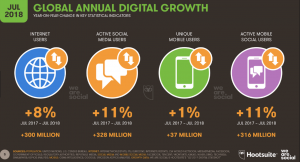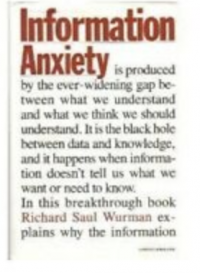Difference between revisions of "Information Overload"
| Line 30: | Line 30: | ||
===Information Reliability=== | ===Information Reliability=== | ||
- with all the information available, hard to discern what is real and what is fake news | - with all the information available, hard to discern what is real and what is fake news | ||
| + | |||
| + | |||
| + | |||
Within the realm of shared content, social networking platforms like [https://en.wikipedia.org/wiki/Facebook Facebook], [https://en.wikipedia.org/wiki/Instagram Instagram] and [https://en.wikipedia.org/wiki/Snapchat Snapchat] have served as significant contributors to the amount of information individual users are subjected to on a daily basis. As users grow connected to increasing amounts of content, there has been a popularized call to action to reduce the amount of time spent on social media and mobile devices in general. Apple has recently introduced a "Screen Time" functionality which aims to help users become more aware of how much time they are spending on the consumption of social media content. Effectively, any form of content can be potentially overwhelming. | Within the realm of shared content, social networking platforms like [https://en.wikipedia.org/wiki/Facebook Facebook], [https://en.wikipedia.org/wiki/Instagram Instagram] and [https://en.wikipedia.org/wiki/Snapchat Snapchat] have served as significant contributors to the amount of information individual users are subjected to on a daily basis. As users grow connected to increasing amounts of content, there has been a popularized call to action to reduce the amount of time spent on social media and mobile devices in general. Apple has recently introduced a "Screen Time" functionality which aims to help users become more aware of how much time they are spending on the consumption of social media content. Effectively, any form of content can be potentially overwhelming. | ||
Revision as of 01:53, 21 April 2019
Information overload (also known as “information glut”, “infobesity”, and “information anxiety”,) refers to the mental exhaustion that comes from being exposed to too much information. This exposure leads to an increased difficulty in the comprehension of an issue. Because, we are in the technological era, this issue is becoming more prevalent as there are abundance of data and information online (and in the physical world around us). One can become overwhelmed when trying to gather particular pieces of information as it is difficult to filter or reduce the information size into smaller chunks so its digestible. Luciano Floridi discusses the overwhelming nature of information overload and notes that, “…at a certain point the system does not absorb anything”. For example, humans can be considered the ‘system,’ for they have a limited capacity to absorb and process the information.
Modern technological systems has been a driving force in accommodating the large amounts of data that are accessible for personal and organizational use information technology. While algorithms and filters allow people to manage the large quantities of information that they are presented, there still are ethical implications - hinderance in an individual's ability to make informed decisions. Moreover, as a result of one's effort to reduce information overload, they might find him/herself in a filter bubble (or an echo chamber) - which has proven to be dangerous.
History
Early Information Preservation
Information preservation has been prevalent since its emphasis by Renaissance humanists. This primarily followed Gutenberg's invention of the printing press and the ability of the general public accessing information that can't be obtained in a short period of time. Within the 1700’s a growing concern developed pertaining to the increasing availability of books. Specifically, within Germany, France, and England as there was a significant surge of the production of books from 1750 to 1800: an increase of 150%. Christian Thomasius argued that the standards of the books being published was decreasing given the large volume that was being produced. [1]. This depletion of book standards may be considered the first observed setback as a result of information overload.
Computing Era
Over the last half-century, there has been an information explosion. The first time this term was used was in a New York Times article in 1964 when author Walter Sullivan described that there was much to be discussed involving this phrase and its dominance in an emerging information culture[2]. Revolutions in the way information is stored through computer hard drives gave way to an exponential increase in the amount of information being preserved and consumed. Between 1983 and 2000, the amount of rigid disk drive space sold per year went from 90 terabytes to over 2.8 million terabytes, more than a 30,000% increase, despite the world adult population growing from approximately 4.5 billion to 6 billion, a 33% increase, over that same time span.[3]
Social Media and the Digital Age
The introduction of the digital age has exponentially increased the speed at which information is produced and published. Information overload has been worsened through the readily available nature of interactions through social media, email, text messaging, news, and more. Studies found that in 2018 the typical smartphone user checked their phone 47 times per day on average, spending just under three hours using smartphones and over four and a half hours when factoring in smart tablet usage[4].
More recently the digital age has seen the introduction of cloud storage, as well as continually improving disk storage technology. Cloud storage enables users to store information within a network medium instead of tangible disk space, making it available to them any time they have access to the network, typically the Internet[5]. This technology has begun to eliminate the need for smaller physical data storage units such as flash drives, SD cards, and portable hard drives. Prominent examples of cloud storage include Google Drive, iCloud, and Microsoft Cloud. Likewise, technology for tangible storage space continues to improve, with data storage giants Micron and SanDisk releasing the first ever 1 terabyte micro SD cards in February of 2019[6].
These evolutions in data storage technology continue to make information more readily accessible to consumers and putting them at greater risk of information overload.
Ethical Issues
Endless Connectivity
- some people instantly on call for work, etc. - too much information consumption wears out the brain, cite studies
Social Withdrawl
- 85% of people surveyed by gifographics admitted to using cell phone at dinner table - studies on cell phone addiction
Information Reliability
- with all the information available, hard to discern what is real and what is fake news
Within the realm of shared content, social networking platforms like Facebook, Instagram and Snapchat have served as significant contributors to the amount of information individual users are subjected to on a daily basis. As users grow connected to increasing amounts of content, there has been a popularized call to action to reduce the amount of time spent on social media and mobile devices in general. Apple has recently introduced a "Screen Time" functionality which aims to help users become more aware of how much time they are spending on the consumption of social media content. Effectively, any form of content can be potentially overwhelming.
Internet Reliability Controversy
The average person now has access to billions of publications, each with their own biases and political affiliations. The accuracy and credibility of these publications have become increasingly questionable. This idea of “fake news” is one that has gained traction and has contributed to feelings of anxiety, confusion and overwhelm when taking in information. The onus has shifted onto the users (and away from the sources) to read with a critical perspective and question the credibility of sources, texts and publications.
Adjusting to Information Overload
The recent decade has seen a surge in the demand for techniques and methods to adjust to - and cope with - the rising amount of information. Given the nature of this topic, there are two ways that an individual can choose to deal with it: (1) he/she can attempt to reduce the amount of information that is incoming or (2) he/she can expand upon his/her ability to sift through and process information. With respect to a reduction in information, minimizing the number of notifications that an individual receives may reduce the overwhelming amount of “noise” that an individual is subject to. [7].
Richard Saul Wurman describes the issue of information overload as being one of the organization of information, rather than an issue of there being too much available. This “information anxiety” is, therefore, the result of a disorganization of complex data as well as the average person not being “information literate” in their ability to process and interpret an abundance of information. Information Management has gained its relevance as an organizational priority due to the fact that it adds efficiency to the process of creating relevance to (and the transformation of data to) information.
Ethical Implications
The main ethical concern regarding information overload is the concept that the average person's ability to make decision is tampered with due to the overwhelming amount of information that is available to them. There has also been an increase in the level of entropy that an individual experiences with the increasing amount of information that they have access to. This is primarily caused by the misalignment of the rate at which digital information is being produced and the rate at which individuals can process information. There soon develops a "poverty of attention". [8]
Luciano Floridi discusses the many ethical implications of having access to a plethora of public information. He acknowledges a greater discussion of privacy concerns dealing with individuals in public groups. He questions, ""does respect for individual's privacy require respect for privacy of the group to which the individual belongs to?"[9].
With an abundance of different sources of information online, it is possible to remain in an information bubble. For example, Shirley Chapian exists in a far right echo chamber, where she receives and shares information exclusively from far right sources. [10] These echo chambers act to strength existing biases. Eli Pariser calls these information bubbles filter bubbles-the bubble that users get stuck in when they use too many filters. Essentially, the filter bubble causes users to filter their results down so narrowly that they do not encounter any information that challenges their current perspective. The filter bubble is created because of the problem of information overload, so it becomes increasing important to combat this problem.
Future Trends
Recent research suggests that an "attention economy" of sorts will naturally emerge from information overload. Matthew Crawford defines this as "Attention is a resource—a person has only so much of it." [11].This impacts business in both the products consumers look for and how business communicate internally with a growing desire for instantaneous reach and information. Whether it is the management of internal emails or the management of large amounts of data, this overwhelming feeling that comes with large amounts of information has seeped into a corporate setting.
See Also
References
- ↑ Blair, Ann "Information Overload’s 2,300-Year-Old History" 'HBR, (Retrieved 26 February 2017.)
- ↑ "Information Explosion." https://www.definitions.net/definition/INFORMATION+EXPLOSION
- ↑ Sweeney, Latanya. "Explosion in Data Collection and Data Sharing." Data Privacy Lab. 2003. https://dataprivacylab.org/dataprivacy/projects/explosion/index.html
- ↑ Gifographics. "Addiction to Smartphones: Facts and Statistics." https://gifographics.co/addiction-to-smartphones-facts-and-symptoms-infographic/
- ↑ Rouse, Margaret. "What is Cloud Storage?" TechTarget. https://searchstorage.techtarget.com/definition/cloud-storage
- ↑ Byford, Sam. "1TB microSD cards are now a thing." Circuit Breaker. https://www.theverge.com/circuitbreaker/2019/2/25/18239433/1tb-microsd-card-sandisk-micron-price-release
- ↑ Pot, Justing "Eating Only Dessert: Why Your Information Diet Is Probably Terrible " 'MUO, (Retrieved 26 February 2017.)
- ↑ Schweller, Randall. "The Age of Entropy." 16 June 2014. Foreign Affairs. https://www.foreignaffairs.com/articles/united-states/2014-06-16/age-entropy
- ↑ Floridi, Luciano. "Big Data, Small Patterns, and Huge Ethical Issues" Mar 2014. Oxford Internet Institute. https://www.oii.ox.ac.uk/videos/big-data-small-patterns-and-huge-ethical-issues/
- ↑ Saslow, Eli The Washington Post (2018) "How lies become truth in online America"
- ↑ Crawford, Matthew "The Cost of Paying Attention" 'NY Times, (Retrieved 26 February 2017.)

